












person is registrable as a taxpayer, whether a taxpayer les his tax returns or, whether the correct amount of tax has been declared and paid etc.
has recovered in excess of 93 million dollars and additional 421 million cedis from multinational and local companies operating in the country through its informants’ reward scheme.

These were hitherto taxes that the State could have lost as a result of the rm’s unwillingness to pay until the intervention of these informants who used the Informant Application system to draw the attention of the Authority.
The respective informants have been rewarded handsomely for the initiative.
Speaking to Journalists on the revival campaign for the GRA informants reward scheme, Acting Head of Intelligence at the Ghana Revenue Authority, Wisdom Xetor noted that this is an indication that the Informant Reward Scheme is e ective and must be encouraged among citizens.
“We have recovered more than 421 million cedis as well as 98 million dollars so far even before the year could end, so I think the scheme is yielding results and many are providing information that is leading to recovery of these taxes that could have been lost if this avenue is not provided for them to give information to us about the improprieties relating to tax payments in the country,” he said.
The Informant award scheme is a means of awarding individuals, entities or organizations who o ers information to the Ghana Revenue Authority (GRA) on persons who commit o ences or companies under the tax laws of Ghana.
This Information is relied upon to enforce compliance with the tax laws.
This information is often relied upon to determine whether a


Explaining the terms and amounts paid to informants, Mr. Xetor noted “Informants whose information led to recovery below Gh¢2,500,000 be paid 25% of interest or penalties capped at Gh¢25,000.
Where the amount exceeds Gh¢2,500,000 a one percent (1%) of total collections capped at up to Gh¢250,000.
Also, in the situation where the amount recovered exceeds Twenty-Five Million (Gh¢25,000,000), top management in consultation with the board determine the amount to be paid.
But in the event where there are no penalties and interest and the amount recovered is less than (Gh¢5,000 to Gh¢25,000 will be paid as Commissioner-General deems t”. He also added that the GRA treats the security of its informant very con dential.
The GRA is hopeful that many will volunteer information that will lead to the recovery of more taxes for the state.
“cedi liquidity tightening measures, resulting in the o oading of forex, as a store of value, by speculators; the improvement of forex ows from remittances and the mining sector; and the reaching of a sta level agreement with the IMF for a US$3 billion package.”
Akufo-Addo, has stated that the appreciation of the cedi against all major trading currencies is as a result of deliberate policy interventions introduced by Government over the last few months.

do, “the strengthening of the cedi has not happened by chance, but through the implementation of deliberate policies by Government, in collaboration with the Bank of Ghana.”
These measures, he said, include
The President made this known on Sunday, 18th December 2022, when he delivered an address at the centenary celebration of the Ga Presbytery of the Presbyterian Church of Ghana, held at the Black Star Square, Accra.
Addressing the congregation, which included the Moderator of the Presbyterian Church of Ghana, Rev. Prof. Joseph Obiri Yeboah Mante, he stated that,
from page 2
with appropriate policy, determination and hard work the part of Government, things are beginning to turn around.
Whilst acknowledging that the country was by no means “out of the woods yet”, he assured that Government will continue to work hard to maintain and sustain the gains made.
“Indeed, in the weeks ahead, the Bank of Ghana will continue with the purchases of forex from the mining and oil sectors to enhance liquidity supply to the market; continue with the single, uni ed forex forward auction and some modest targeted bilateral support to critical imports; and the implementation of the
gold for oil swap transaction, which will signi cantly remove forex pressures on the cedi,” the President said.
It is in view of this that he added his voice to those of GUTA, GRTCC and others to appeal to manufacturers, traders and transport operators who, at the height of the cedi’s recent depreciation, increased prices of goods and services, to reduce their prices now that the cedi is re-gaining much of its strength.
“I believe this is not only a fair request, but also a just one, and I urge all of you to join me in this clarion call, so we can all have a more pleasant Christmas,” he added.
National Cathedral
Thanking the Presbyterian Church of Ghana for the support it continues to give for the construction of the National Cathedral.
He stated that, upon completion, the National Cathedral will serve not only as the country’s collective thanksgiving “to the Almighty for the blessings He has bestowed on our nation, sparing us the ravages of civil war that have bedevilled the histories of virtually all our neighbours, and the outbreak of deadly mass epidemics, but also as a rallying point for the entire Christian Community of Ghana, which represents seventy plus percent
(70+%) of the population.”
The President, therefore, asked the Ga Presbytery, and, indeed, all Christians, to continue to pray for Ghana’s peace and unity, so the nation can move forward in unity.
“I need the support of every Ghanaian, together with the prayers of the Church, to help me and my government carry out our mandate successfully. Pray for me so that Almighty God will continue to give me wisdom, strength, courage and compassion to enable me execute my duties as a good leader. With Him, all things are possible, as the Battle is the Lord’s!! For this too shall pass!!”, President Akufo-Addo said.

services and hand-holding support for their SME customers. The Bank has also been selected as one of the 13 banks in the country to support SMEs under the YouStart program which will o er support to young entrepreneurs by providing them a great start to business. The Youstart programme will also target young entrepreneurs who have special problems in accessing capital for their business. The bank will o er capital with exible payment schedules and more importantly, support them with advisory services on how to use the capital and manage their businesses.
mony held at the Dubai Palm Jumeirah - Waldorf Astoria on 10th December, 2022.
The Global Brand Awards was established with the aim of honoring excellence in performance and rewarding companies that have performed extraordinarily in the eld of Finance, Education, Hospitality, Lifestyle, Automobiles, Healthcare, Security and Technology. The awards are also given to acknowledge key players who strive for nesse and provide a platform for recognition. It covers the e orts of the companies to create awareness about the signi cance of exceptional service delivery and rewards their performance with
commitment of FBNBank to supporting SMEs is one of the brand’s main promises which has been emphasized in delivering the ultimate gold standard of value and excellence to their clients and customers.
Dedicating the award to customers and sta of the bank, Head of Commercial Banking, FBNBank, William Amon Neequaye who received the awards on behalf of the Bank said, “our long-running support for the growth and development of small businesses stems from our recognition of SMEs as critical agents of economic transformation in Ghana. That is why we constantly innovate new ways of helping
our business.”
Commenting, FBNBank Ghana MD/CEO, Victor Yaw Asante recommitted the Bank to its focus on commercial and SME clients as they continue to be their core market segment. FBNBank has made conscious e orts to get closer to SMEs by expanding its branch network with presence at Abossey Okai, the refurbished Tema Community 1, Atomic Junction and the latest East Legon branches all poised to attend to the needs of SMEs and retail customers around these environs. Additionally, FBNBank has developed an attractive SME o ering which is backed by focused business advisory
FBNBank has in its 26 years of operating in Ghana remained focused on putting its customers rst. This, it has sought to do through the value and excellence of what the Bank contributes to the relationship with its stakeholders, particularly the customers. FBNBank Ghana is a member of the First Bank of Nigeria Limited Group which is renowned for its great customer service and general stakeholder engagement garnered over its 127 years of operation. FBNBank Ghana has 23 branches and three service points in the country with almost 500 sta . FBNBank o ers universal banking services to individuals and businesses in Ghana.
Patricia Obo-Nai, Chief Executive O cer (CEO) of Vodafone Ghana, has urged corporate institutions, particularly those in STEM elds, to strive for gender parity by hiring more women.
Patricia issued this call during her remarks at the introduction of the Seats for Ladies in STEM (S4LIS) initiative. The initiative is designed to accelerate Ghana's development by encouraging women to embrace STEM.
According to her, Ghana is no di erent from other Sub-Saharan African nations in that only about 30% of women graduate from postsecondary education in engineering professions. Approximately 30% of all tertiary students are women, according to the demographic census conducted in 2021. “Because of this, we lose the ideas and contributions our women could make to scienti c research and
workforce, foster growth and creativity across the nation, and produce more comprehensive solutions that are bene cial for everyone.
Let us expand the number of women who work in STEM elds, welcome them into our workplaces, provide seats for them, and encourage them along the way, but more signi cantly, let us get them into boardrooms where they can in uence decisions," she added.
The government, educational institutions, and other stakeholders have made investments in STEM elds for girls, and Patricia acknowledged these e orts.
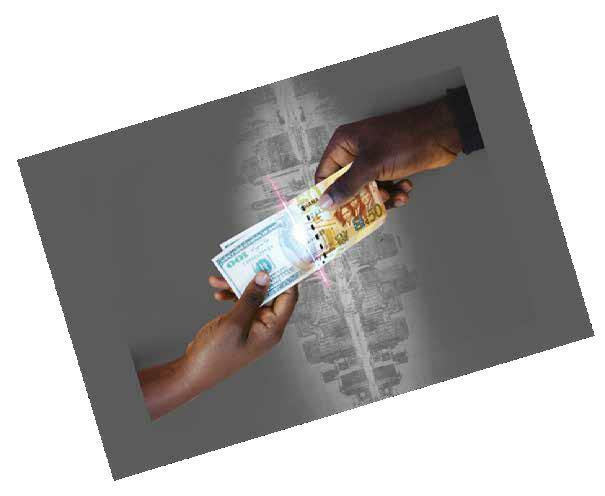
To support these investments, the Ghana Chamber of Telecommunications' S4LIS initiative aims to raise the proportion of women holding STEM-related
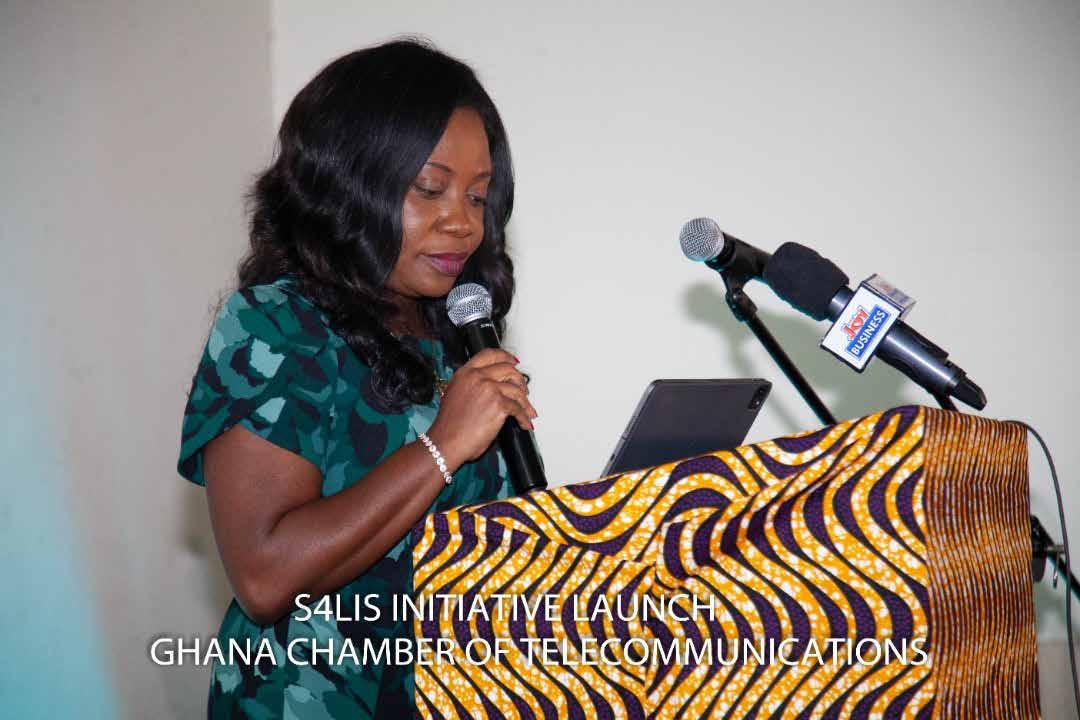
positions from 30 percent in 2021 to 40 percent by 2031.
The initiative was launched under the theme "Bridging the Gender Gap in STEM in Ghana," and is a collaboration between the Ghana Chamber of Telecommunications and the Ministry of Communication and Digitalisation.
In attendance were the Minister of Communication and Digitalisation, Ursula Owusu-Ekuful, Chief Executive O cer of the Ghana Chamber of Telecommunications, Dr Kenneth Ashigbey; the Chairperson of the Ghana Chamber of Telecommunications; and Vodafone CEO, Madam Patricia Obo-Nai, among others.
A Gambian Export and Investment Delegation on Thursday, 15th December, 2022, paid a courtesy call on the Ghana Export-Import Bank (GEXIM) at the Bank’s headquarters at the Africa Trade House in Accra.
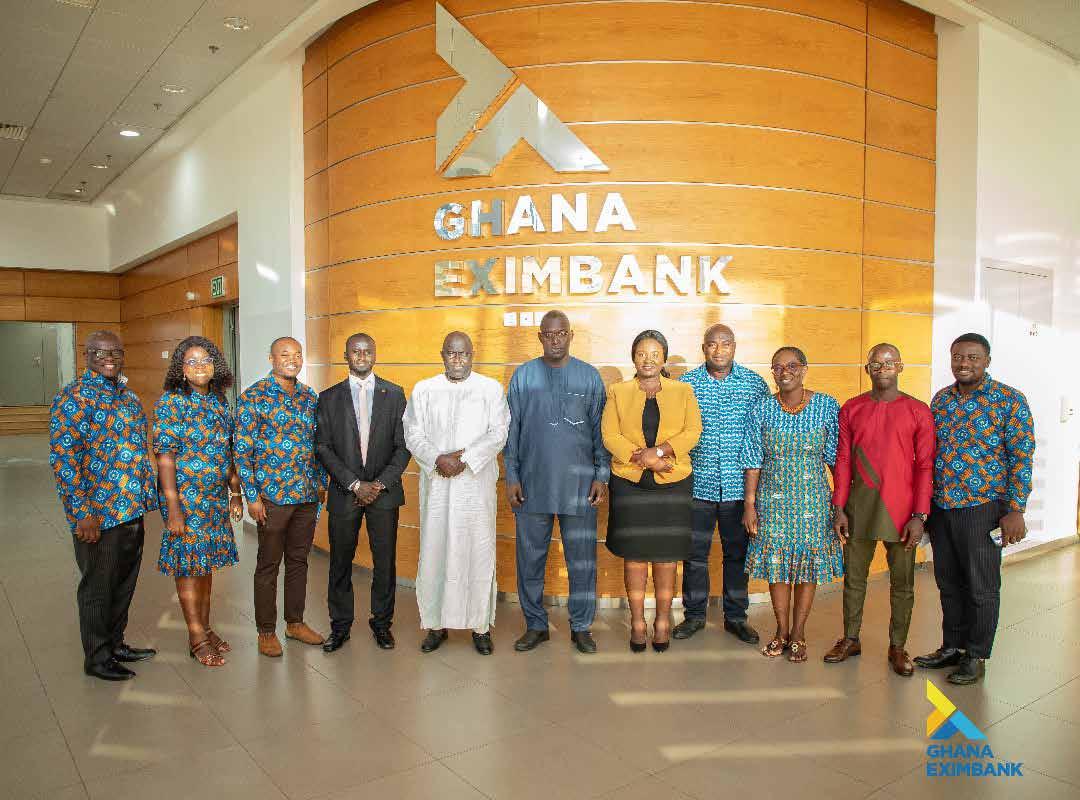
The Bank’s Deputy Chief Executive O cer responsible for Finance and Administration, Mrs. Nana Akyaa Obeng-Adiyiah, received the delegation on behalf of the Chief Executive O cer, Mr. Lawrence Agyinsam. The Delegation included Mr. Hassan Gaye, the Deputy Permanent Secretary for Industry, Investment and Employment of the Republic of Gambia, Mr. Ousainou Senghore, Chief Executive O cer of the Gambia Investment and Export Promotion Agency (GiEPA), Mr. Baboucarr Camara, Communications Manager of GiEPA, and Mr. Omar
K. Jammeh, Business and Export Development O cer of GiEPA.
The courtesy call was a follow up to a study tour to GEXIM by some o cials of GiEPA and representatives of the Gambian Ministry of Finance undertaken on Thursday, 1st December 2022 to get a deeper insight into the Bank’s operation and its innovative approaches at championing the Government of Ghana’s agenda to transform the Ghanaian economy into an export-led-one.
Receiving the Delegation, Mrs. Nana Akyaa Obeng-Adiyiah expressed the Bank’s willingness to collaborate with the Government of Gambia and GiEPA through various programmes of mutual interest.
“We are excited you have selected GEXIM as one of the key Ghanaian institutions to have closer collaborations with as a result of the various success stories from our innovative initiatives in helping Ghanaian businesses as well as our pivotal role in championing the repositioning of the Ghanaian economy into an export led one. We are looking forward to further engagement leading to collaboration on several levels for mutual bene t”, she added.
On his part, Mr. Hassan Gaye highlighted the need for deepening collaboration between the two governments for the bene t of its citizens. “It is also very important for government agencies and departments of the two countries to explore areas for increased e orts in promoting trade between the two countries
under the African Continental Free Trade Area (AfCFTA) , which presents a major opportunity for countries to boost growth, reduce poverty, and develop their economies”, he further added.
The Gambian Delegation later visited the GEXIM Made-In-Ghana shop (MiG Town), located at the ground oor of Africa Trade House in Accra.
The GEXIM MiG Town is an outlet that stocks assorted, innovative and well packaged Made-In-Ghana products including food and ingredients, beverages, skin and beauty care products, textiles, apparel, garments, leather footwear and slippers and many others.
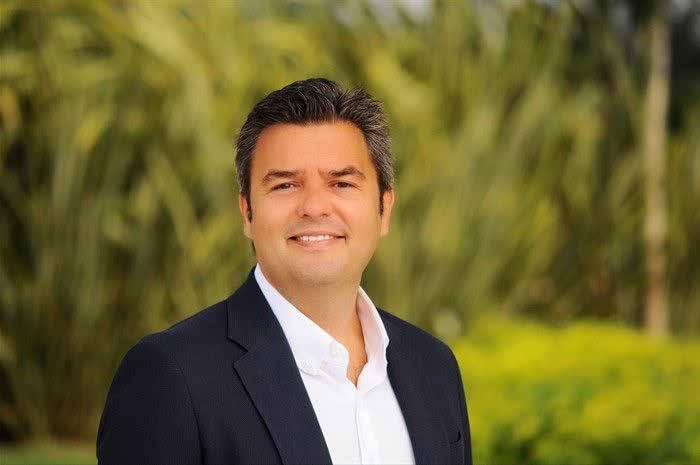
existing address book to quickly and easily connect with your contacts.
5. CHAT WITH EVERYONE: Send SMS text messages to anyone in your contact list, regardless of whether they've installed ayoba or not. If the friend you send to does not have the app, the message will be delivered by SMS. They can respond by SMS and it will come back into your app. This is a unique technology.
6. GROUP CHAT: The more the merrier! Set up group chats to easily communicate with friends and family in a single chat.
7. SHARING IS CARING: Share videos, images, audio, and other les with your contacts.
MTN, in partnership with ayoba, Africa’s Super App, has reached an exciting 20 million monthly active users on 5th of December 2022.
This represents growth of 100% compared to the 10 million monthly active users recorded at the same time last year. “We celebrate this milestone and are pleased that, through ayoba, we are able to provide accessible communications, so that millions of people across our markets can enjoy the benets of a modern connected life”, says MTN Group Chief Operating O cer, Jens Schulte-Bockum. ayoba is available globally with a focus on the African continent. Key markets in MTN’s footprint include Nigeria, Cameroon, South Africa, Ghana, Cote d’Ivoire, Uganda and The Republic of Congo, giving ayoba a strong footprint across Africa. ayoba was also in the news recently when it was voted “Top Innovative Technology and Telecom Product of the Year” at the Ghana National Communications Awards in November 2022. ayoba CEO Burak Akinci said: “It has been an exciting year. Providing the best experience to our users has always been our top priority and we are working very hard to improve our service everyday. It is a pleasure to see that our e orts are well received and appreciated by our users all around Africa.
“This achievement is the result of listening to our users, under-
We would like to thank our users who never fail to provide feedback and insightful input.
“We will continue to develop what is a robust messaging service in ayoba, that continues to o er new functionalities, free music service that has grown to millions of streams, high quality games, a wide range of channels with curated local content, and hundreds of new MicroApps”
Strong engagement, growth in 2022 and diversity of content ayoba has shown immense growth across all verticals this year. Leading the charge is the music streaming service, with its focus on local content and growth in streams of 174% in 2022.
In terms of engagement, our users viewed 225 million cards across 150 channels on a variety of topics led by football updates, tech and entertainment news, food and fashion, rugby and other sports. Our French language content was led by in uencer Muriel Blanche and Adamant Media, with francophone comedy.
In 2022, we launched three new Arabic channels providing growth in content for markets like Sudan, covering entrepreneurship, football and other issues. In December 2022, the year-on-year growth for messaging was 125% (messages sent), games by 208% (plays) and MicroApps by 322% (sessions).
Ayoba users posted a 85 million
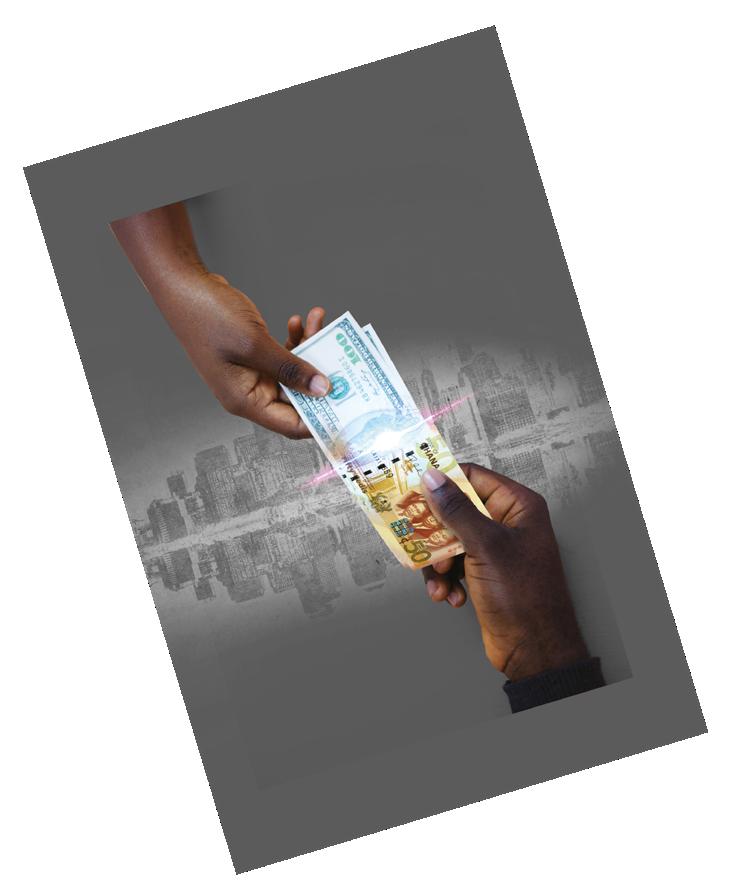
“This is a phenomenal endorsement of our ‘Made in Africa for the World’ strategy” continued Akinci. “We believe in the vast potential of African digital talent and do our best to support them, from training to hackathons and accelerator programmes. 2023 will be even more exciting with all the new features and services we plan to introduce to make the ayoba platform the gateway to the digital economy for startups across di erent markets in Africa. ayoba is an application open to all networks developed as a partnership initiative with MTN. ayoba users receive free daily data in participating markets. The platform is part of MTN’s Ambition 2025 strategy, which targets 100 million monthly active users by 2025.
10 reasons to use ayoba: 1. FREE TO USE: ayoba is free to use –including all of our amazing features! You need data to get onto the internet, but if you are on the MTN network in selected countries, you will get free data every day to use the app.
2. CHAT AND CALL NOW: Instantly send and receive text and voice messages, voice notes, as well as voice and video calls with any of your contacts. Please note that Voice and Video call are subject to standard data charges for all users.
3. SECURE: End-to-end encryption means that messages in a conversation cannot be read by anyone else.
4. FIND YOUR FRIENDS: Use your
8. LET’S MEET: Share your real-time location with your ayoba contacts.
9. CHANNELS: Free access to consume all content across various categories ranging from news, sports, fashion, music, education to entertainment and much more, all within the ayoba app. All of our channels are Africa centric – such as the Black Star channel for Ghana, Scrolla Africa in IsiZulu, Yoruba & Hausa, Pulse Channels for Nigeria and Ghana covering business news, current a airs and entertainment; with over 20 artist channels highlighting African musicians.
10. LISTEN AND PLAY: Our free music service allows users to listen to trending songs in our fantastic playlists, featuring the best of local and international music. We have games that you can play as well, such as Subway Surfers, CR7 Strike, Car Rush Spore Hunter, BattleShip, Pinball, Solitaire and more. New content is added every day. About the MTN Group Launched in 1994, the MTN Group is a leading emerging market operator with a clear vision to lead the delivery of a bold new digital world to our customers. We are inspired by our belief that everyone deserves the bene ts of a modern connected life. The MTN Group is listed on the JSE Securities Exchange in South Africa under the share code ‘MTN’. Our strategy is Ambition 2025: Leading digital solutions for Africa’s progress.
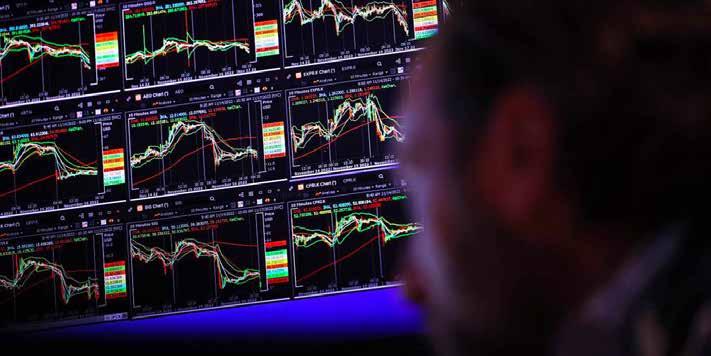 By Michael J. Boskin
By Michael J. Boskin
political chaos of 2022 has exposed the limits of forecasting. Recall the outlook from mid-2021, when very few observers were worried about in ation (I was among the small minority that was). The “Blue Chip” consensus – re ecting the views of 50 private-sector forecasters – was that the US consumer price index would rise by just 2.5% in 2022. Yet over the last 12 months, “core” CPI, which excludes volatile food and energy prices, has risen by 6%.
Similarly, the US Federal Reserve’s preferred measure –the core personal consumption expenditures index – was expected to rise by just 2.7%; it is up 5%.
Then, when in ation did begin to surge, many insisted that it would be “transitory.” The Fed’s historically rapid tightening of monetary policy – repeatedly raising its policy rate by 75 basis points, before tempering its hikes with a 50-bps increase this month – was hardly on Fed watchers’ radar screens. In mid-2021, the three-month US Treasury bill yielded just 0.1%. Today, the yield is 4.23%.
Given these forecasting mis res, few in mid-2021 predicted a recession within the next few years. But now, almost 90% of Blue Chip analysts expect that real (in ation-adjusted) GDP growth in 2023 will be 1% or less, and about 40% of that cohort puts it at zero or negative. After large gains during the lockdown year, equity markets have entered bear territory, with technology stocks taking a huge
Political forecasts didn’t fare much better. Few predicted that right-wing governments would come to power in Sweden and Italy, or that Binyamin Netanyahu would once again become Israel’s prime minister. Most pollsters in the United States anticipated a “red wave” of Republican victories in the midterm elections. But the party lost a Senate seat and gained only a narrow majority in the House of Representatives, not least because candidates endorsed by former President Donald Trump underperformed across the board.
What about 2023? Despite all the bad recent predictions, policymakers, investors, and households still need to plan for the future, which requires establishing a baseline outlook. As matters stand, the US economy is sending decidedly mixed signals. The labor market remains fairly robust. But with an unemployment rate of 3.7% and 1.7 job openings for every unemployed person, businesses are struggling to nd workers. And while the employment rate has returned to its pre-pandemic levels, labor force participation still lags, most worryingly among prime-age (25-54 years) males.
All told, there are roughly 1-2 million “missing workers” who presumably would be in the labor force if not for the pandemic disruptions. Some older workers who lost their jobs ended up retiring early, but others have not returned because of ongoing health
concerns, a lack of childcare, expanded government relief payments that disincentivized work and raised savings (perhaps half of which have been drawn down), or changes in work-life balance preferences. Beyond persistent in ation and tighter monetary policy (which will remain in place until there is signi cant progress toward the 2% target rate), the single biggest factor in the 2023 outlook is how rms will respond to a likely reduction in demand. Will businesses announce substantial layo s, as usual? Or will the di culties in nding and retaining quali ed workers lead them to sacri ce short-run profits to keep people on the payroll? (Many have already been laid o in the tech sector, but that is because those companies binge-hired in 2020 and 2021.)
The biggest negative factor, in ation, has slowly abated, but it remains several times higher than the Fed’s 2% target. The question, then, is whether price stability can be quickly restored through slower demand growth, resolution of supply-chain issues, and tighter monetary policy. One major risk is that rms will raise wages to attract or retain employees, setting o a wage-price spiral. Thus far, wage growth has lagged price growth (which is why many poll respondents believe the US is already in a recession); but there is no guarantee that this trend will last. Central-bank doctrine holds that monetary tightening operates with a long and variable lag (often 12-18 months), and that
the target interest rate must rise above the expected future in ation rate for some period. In ation in 2023 is expected to be around 4%, according to the Blue Chip forecast; below 3%, according to the bond market; and almost 5%, according to consumer sentiment surveys. Optimists are expecting modest additional Fed rate hikes from the current 4.25-4.5% level. The Fed envisions a peak of 5.1%. But hopes for some easing toward the end of next year receded this month with Fed Chair Jerome Powell’s suggestion that rate cuts (back toward 4.1%) will not come until 2024. And even that schedule presupposes signicant progress toward the Fed’s 2% target. Such “soft landings,” with minimal job losses, are historically rare.
The even bleaker outlook for many other economies will compound the di culty of engineering a soft landing. Against the backdrop of anemic growth or outright recession from China and Europe to developing countries in Latin America, Asia, and Africa, the dollar’s continued strength is bad news for US exports.
Once the new Congress convenes on January 3, Republicans will likely block most of US President Joe Biden’s initiatives, especially on spending, which will take scal pressure o the Fed’s in ation ght. They will do their best to limit the passage of new regulations, and to step up oversight of executive branch agencies.
House Republicans will pass their own conservative scal and domestic agenda and try to get the Senate to take up bills that will expose the Democrats’ embarrassing positions on issues such as illegal immigration, crime, spending, and the like. Senate Democrats and Biden will ignore most and reciprocate, and all major legislation is likely to stall. At the end of the day, that may be a good thing, given the current Congress’s dubious legislative record, which has already proved far too costly for whatever modest bene ts it provides.
When I told my classmates at our monthly meeting during the week about my encounter with a young lady attendant at a lling-station recently, rather than sympathise with me, they had a hearty laugh at my predicament.
In the early 1970s when I was taught about diesel and petrol engines as part of my basic Armoured Reconnaissance (Recce) training, I recall my instructor tell us it was unsafe for one to allow the fuel gauge of diesel engine vehicles to go low because of “air-lock!”. Probably to compensate for this, diesel burnt more slowly than petrol and was therefore cheaper. So, haulage trucks and big vehicles all used diesel. Cars generally used petrol. Diesel cars in Ghana were rare at the time.
Indeed, when my friend Malam brought home a diesel car in the 1980s, a lling-station attendant lled it with petrol for him as he chatted with a friend. When the error was pointed out to him, the surprised attendant said “master, cars don’t use diesel, only trucks do,” convinced that Malam was wrong!
When I started using my diesel pick-up a decade ago, I told myself that, my fuel gauge would never go below half-tank, armed with my knowledge forty years earlier about “air-lock.”
On my way home recently after church, I decided to top up my tank as my gauge read half full. The polite young lady attendant asked “daddy, how much?”
see surprise on her face as she smiled broadly at me. I guessed she had not heard the instruction “ ll it” for a while. What I did not factor into my decision to ll my tank was that, the price of diesel had jumped to over twenty-three cedis per litre that morning. As she crossed six-hundred Ghana cedis, I started getting uncomfortable with embarrassment staring me in the face when I realised I had underestimated, and that my eight hundred Ghana cedis momo could not ll my half-tank.
Therefore, at seven-hundred Ghana cedis, I yelled in a parade-ground command manner at the lady, “Stoooppp! (STOP). The amused young lady burst into laughter seeing my con dent “ ll it” evaporate and replaced by a desperate “Stoooppp” at seven hundred cedis!
Smiling back at her, I consoled myself that, after all doesn’t the Spanish proverb say “a wise man changes his mind, a fool never will?” Indeed, Proverbs 12:15 states that, “the way of a fool is right in his own eyes, but he who heeds counsel is wise!”
Elsewhere, including our western neighbour Ivory Coast, diesel price is lower than petrol. This is because, among others, most if not all the trucks which haul food to the urban areas use diesel. An increase in the price of diesel ends up being passed to the consumer in terms of food, transportation, indeed everything.

meeting, classmates whose wives do their marketing at Madina, Achimota, Tema and other markets asked how workable the ministries plantain sales were, if fuel, particularly price of diesel, remains so high in Ghana. A recent release states that some lling-stations have in addition to the already high fuel price, adjusted their machines to cheat buyers by giving us less fuel than we pay for! The public has therefore been advised to buy fuel in litres, and then calculate what to pay by multiplying the number of litres by the displayed price! As a frustrated presenter asked recently “What kind of people are we?”
A quote in my article “October 2022” states, “In Lower Sixth-Form in 1970, the subject “In ation” was taught us in our General Paper class by a young teacher we all called “Archie.” He taught us that, in in ationary times, pensioners su er most because while prices rise, pensions remain constant! The value of pensions thus gets whittled away as the same amount of money buys fewer goods and services. If we thought we understood Archie then, now we understand him better! Analysis I wish I could nd our teacher Archie to tell him that, as retirees, we now understand better, what we thought we did when he taught us “In ation” in Lower Sixth-Form in 1970. To say things are tough, is an understatement. From 200 Ghana cedis a pack of 30 tablets for my monthly medication in September 2022, it went to 368 Ghana cedis in Octo-
“Manager’s” complaint was that, one “koobi” (salted tilapia) was 25 Ghana cedis from 15 Ghana cedis last week!
But did it have to come to this, when Rwanda and Botswana are weathering the storm reasonably?”
Mind-change
Changing one’s mind for the better does not mean weakness. Indeed, it rather shows strength. Shouting “stoooopppp” to the lling attendant when I realised I was heading for embarrassment with my initial instruction of “ ll it” did not demean me in any way.
I have di culty understanding why as of December 5, 2022, a gallon of diesel in Ivory Coast which has fought a civil war should sell for the equivalent of $3.96 and $5.8 in peaceful Ghana with no civil war history. Are we not supposed to be an oil exporter after winning our dispute against Ivory Coast on ownership of part of the oil elds south of Cape Three Points, at the International Court of Justice in The Hague?
Contrary to what some think, the military teaches us to avoid rigidity in thinking sometimes based on arrogance, and be exible when taking casualties in battle/war after initial plans fail! Failing that, we are court-martialed!
Probably, our managers can learn from the military, the Spanish proverb, and Proverbs 12:15.
Leadership, lead!
Fellow Ghanaians, WAKE UP! The Writer is former CEO, African Peace Support Trainers Association Nairobi, Kenya & Council
The Volta Regional capital, Ho, is known for its spotlessly clean streets, which holds rst time visitors to the municipality captive.
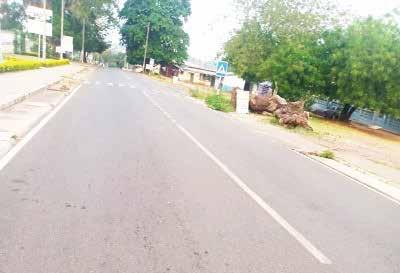
Ho is also referred to as the “Oxygen City of Ghana” due to its environmentally friendly status.
Lounging between the Galenku Hill to the north and the Adaklu Mountain to the south, Ho’s scenic beauty is enhanced greatly during the rainy season by the thick and awesome green vegetative cover on those escarpments.
The regional capital is also revered for its peaceful, serene and low-crime rate.
In recent times, however, that beauty is being marred by the nasty and indiscriminate erection of signposts and the hanging of posters at various junctions in the region capital.
Posters of obituaries, pending events, admission processes of schools and herbal services are competing with signposts for space at the various junctions in Ho, in de ance of the assembly’s bye-laws.
These are readily evident at the Stadium Road-SSNIT Flats junction,the Ho-Kpodzi junction, the Old Tra c Lights junction, the Civic Centre and other parts of the municipality.
The impudent trend is on the increase in spite of growing protests from local residents and motorists who complain that the posters are not only obliterating their view at the junctions but are also posing grave danger to other road users.
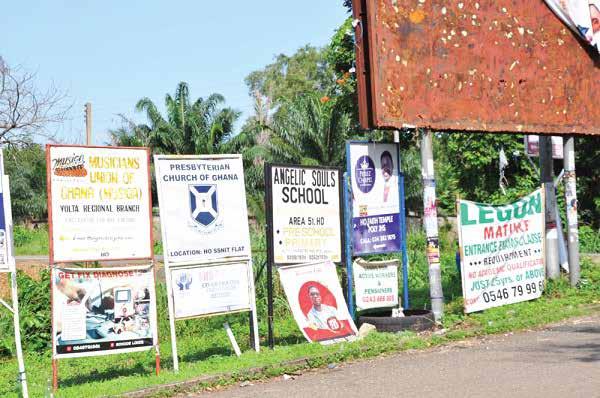
On stormy days, some of the sign posts fall in the middle of the road and get carried about by the strong winds.
Some of the giant signposts are now rusting and tilting gradually towards the ground, indicating imminent danger.
In weird instances, obituary post ers are pasted on electricity trans formers, leaving many with more questions than answers.
A resident at the Ho SSNIT Flats, Kwaku Nsiah, said the posters at the junctions had tainted the beauty of the streets of the regional capital.
He said they obliterated the view of many homes near the junc tions and made life unpleasant
for the occupants of the houses.
He said apart from the sordid scenes at the junctions, the posters sometimes fell onto the streets, turning them into litter spots for long hours and sometimes days.
A taxi driver, William Dogbey, said the posters were a nuisance because they blocked the views of cabs at the various junctions.
“It becomes very di cult for us to see the main road clearly, without knowing which vehicles are coming from the right or the left,” he added.
According to the driver, some of the posters and banners got carried away on windy days, with some falling onto the wind shields of vehicles.
“That makes them a constant danger to road users,” he point ed out.
Another resident, who preferred to remain anonymous, said it was mind-boggling that church es, educational institutions and political parties were among the groups which engaged in the unlawful practice with impu dence.
After public outcry, the Munici pal Chief Executive (MCE), Divine Bosson, has stepped in with a 15-member task force to
the assembly.
“It is the duty of the assembly to ensure that such features do not pose danger or nuisance to the public,” he maintained.
Mozambique is ramping up e orts toward establishing a sustainable energy supply to drive its economy especially the industrialization programme. As it seeks reliable foreign partnerships, it has already shortlisted a few energy groups for the new US$4.5 billion Mphanda Nkuwa hydroelectric dam, on the Zambezi River, located in Tete province that is estimated to generate 2,070 megawatts for Mozambique. It will be 700 metres long and rise 86 metres above its foundations, with 13 oodgates.
The tender for the "Selection of the Strategic Partner or Investor for the Development of the Mphanda Nkuwa Hydroelectric Project" nally in December recieved the results of the market survey carried out in September involving the critical aspects of structuring the project, alignment with potential buyers and shareholder participation. The structure of the energy transmission line, the methodology for selecting the strategic partner, the implementation schedule, among other relevant issues related to the project transaction.
According to Malaysian newspaper The Star, the process of selecting the seven potential investors was made at the end of an investor conference held in Maputo. It further wrote that there were two individual companies and ve large consortiums that previously visited the site to understand the natural conditions of the area and assess the fundamental data to prepare proposals from a technical, economic and nancial point of view.
The newspaper estimated the infrastructure cost between US$4.5 and US$5 billion and have capacity to produce 1,500 megawatts, making Mphanda Nkuwa the second-largest hydroelectric dam in the country, after Cahora Bassa Hydroelectric (HCB), which generates 2,070 megawatts. With the two infrastructures in fully operational energy production, Mozambique hopes to achieve the goal of universal access to energy and respond to the growing energy de cit that plagues southern Africa.
General Director of the Mphan-
da Nkuwa development o ce, Carlos Yum, envisaged that during the construction phase, more than 7,000 jobs will be created, and 50 percent of the energy generated will be exported, contributing to the country's economy and thus making a regional energy hub in Mozambique.
The Mphanda Nkuwa project will be a lower-cost power generation option which will position Mozambique as a regional energy hub, and contribute to universal access, industrialization, job creation and technical training while generating tax and concession fee revenue. The project is fundamental for the energy transition and decarbonization of the southern region of Africa.

Carlos Yum has laid out the status of the Mphanda Nkuwa hydroelectric dam construction project. According to Yun, the project is budgeted at around US$5 billion, and work will start in 2024, the year in which nancing is expected to be de nitively concluded.
The project will take a total of six
to seven years to complete. Of the approximately US$5 billion price tag, 60% is for the construction of the dam and 40% for the power transmission line. At this moment, the development o ce is preparing the launch of public tenders for the updating of the project's feasibility studies.
By December 2022, the o ce will launch a tender for the identi cation of the strategic investment partner, whose nancial closing a 2024 deadline has been set. In terms of shareholding, the Mphanda Nkuwa project will have the participation of the Mozambican state, through Electricidade de Moçambique (EDM) and Cahora Bassa Hydroelectric [(HCB), with between 30% and 35% of shares. The remaining 65% will be secured from private investors.
Carta de Moçambique also informed that there would be consultants involved – from Brazil, the United States, Sweden and South Africa – to assess possible problems associated with the project according to the best international practices,
avoiding pitfalls that have marred previous projects implemented in the province and in Mozambique generally.
It reported that experts and strategic investors, including the World Bank (WB) and the African Development Bank (ADB), have discussed some signi cant aspects concerning the implementation of the Mphanda Nkuwa hydroelectric project.
"Overall, we think this project is very important to the government's goal of universal access by 2030," said Zayra Romo, World Bank Mozambique Lead Energy Specialist and Infrastructure Practice Leader. As for the current stage of the project, which consists of the search for a strategic partner for the development of Mphanda Nkuwa, Romo said that the World Bank's support would consist of ensuring the greatest possible competitiveness for the project, with a view to selecting the best contractor or investors that have experience to e ectively manage Mphanda Nkuwa.
A press release from the Mphanda Nkuwa Implementation O ce
said that these companies and consortia had replied to the tender launched in December 2021, and delivered their pre-quali cation documents before the deadline, rst xed on 28 February but, at the request of several of the bidders, it was extended to 18 April. It is hoped that construction of the new dam (which has been on the drawing board for decades) will nally begin in 2024. Construction will last for at least seven years.
According to the media release by the Mphanda Nkuwa Hydroelectric Project Implementation O ce, the main objective is to ensure the coordination of actions for the implementation of the Mphanda Nkuwa project.
Location: The Mphanda Nkuwa Dam will be located in Tete Province, Centro region, on the Zambezi River, 61km downstream of the Cahora Bassa Hydroelectric Power Plant.
Project description: The Hydroelectric Power Plant will have a capacity of up to 1,500 Megawatts and an Electric Power Transmission Line from Tete to
Maputo with 1,300 kilometres.
Budget: US$4.5 to US$5 billion, 60% for the construction of the dam and 40% for the power transmission line.
Strategic importance: The project will position Mozambique as an energy hub in southern Africa. It will provide lower cost energy in the country and region, contribute to universal access to energy in the country by 2030 and support rapid industrialization, with job creation, skills development and business opportunities (local content). Social and economic bene ts, in the form of royalties and income on concession fees for the Mozambican state.
Environmental approach: The project will be implemented in strict compliance with national standards and internationally accepted best practices for the development of projects of this nature, to mitigate negative impacts and maximize positive aspects. In this context, the Mphanda Nkuwa Hydroelectric Project Implementation O ce recently signed an agreement with the International Hydroelec-
tricity Association for the assessment of the project's sustainability, including training and capacity building.
Mozambique News Agency reported, citing government sources, that there were eight international consortiums interested to become strategic partners of Mozambique in building the Mphanda Nkuwa dam, with electricity production: ETC Holdings Mauritius, Longyuan Power Overseas Investment (Chinese), PowerChina Resources, WeBuild Group, Scatec (Norway), Sumitomo Corporation, EDF and Kansai Electric Power (Japan).
With an approximate population of 30 million, Mozambique is endowed with rich and extensive natural resources but remains one of the poorest and most underdeveloped countries in the world. It is one of the 16 countries, with a collective responsibility to promote socio-economic, political and security cooperation within the Southern African Development Community.
all startups are SMEs, but not all SMEs are startups.
These entrepreneurial endeavours are often founded by one to three entrepreneurs, who concentrate on creating a marketable product, service, or platform in response to a perceived market need.
prises are increasing, heralding the arrival of the Fourth Industrial Revolution in the nation (particularly since the onset of the COVID-19 pandemic).
As a result, the number of startups has dramatically increased.
developed entrepreneurial skills, and a robust corporate sector.
Ghana’s Startup Ecosystem at a glance.
Ghana is becoming one of the most vibrant and developing startup havens on the continent. The country is nally catching up fast with countries such as Egypt, Kenya, Nigeria, and South Africa as some of the continent’s giants when it comes to startups.
Startups are often seen as businesses that are just starting out and have the potential to expand quickly. Due to variations in setup and vision, we can say that
Gleaning from continent-wide prospects, Africa is going digital as a result of a decade of economic expansion, rapid urbanization, internet penetration, and the bankability of its population.
Technological innovation is advancing quickly. Ghana is no exception, as internet penetration has increased over the past ve years.
Ghana is leading the area in technical innovation, and the number and size of digital enter-
Given that the majority of Ghanaian businesses are informal SMEs that still don't use technology or digital solutions, the startup ecosystem's potential for innovation and growth in Ghana is still mostly untapped.
Talent is one of the key components of any start-up ecosystem, and Ghana is developing a sizable talent pool of future digital leaders.
Ghana's development is a result of a number of positive factors, including substantial consumer and business markets, highly
To succeed, most startups require the ideal combination of networks, nancial markets, rules, and culture. Over the past ten years, Ghana has created an environment with a lovely interplay of these elements.
The Ghana Government in recent years has launched various initiatives aimed at developing a robust entrepreneurial and startup ecosystem. For example, to tackle the Ghana government introduced the "National Entrepreneurship and Innovation Plan" (NEIP) in June 2017 as a $10 million program to address the funding gap and lower youth unemployment.
The government's main method for aiding start-ups and small businesses is now NEIP.
NEIP has given over 7000 entre-

preneurs across ten areas of the country specialized training in entrepreneurship and business development through tech hubs.
Again, it has provided 500 of those 7000 entrepreneurs with some initial money to support their most viable business concepts. Additionally, the government promises to give tax bene ts to NEIP participants based on how many workers they employ.
We are starting to witness momentum in the legislation space across Africa as more countries begin to nd the middle ground to launch Acts to regulate their startup ecosystem.
Startup Acts are extensive legislative and regulatory frameworks designed to promote entrepreneurship and make it possible for new businesses to develop with strong growth potential, typically by providing speci c incentives (tax, subsidies, procurement, etc.).
Tunisia, in 2018, paved the way as the rst country on the continent to pass the Startup Acts and this has been followed by Senegal in 2020. Other countries such as Rwanda, Mali, Nigeria, Ghana etc. have all activated conversation to be next in line.
Startups can function with the security provided by a de ned framework for expansion thanks to legislation. With the help of this legislative mechanism, innovative businesses with high growth potential are formed more quickly.
We cannot certainly talk about the startup ecosystem without touching base on the availability of strategic organizations such as entrepreneurship hubs, which have become the key and major driver of growth.
Startups and incubator hubs have become inevitable when it comes to startup ideation, execution, and growth.
Entrepreneurs and startups need a lot of capacity-building and support systems in order to succeed, and that is the critical role played by these entrepreneurship hubs, which are growing across various regions of the
country.
While most of these hubs are technologically driven, there are equally some of these hubs that are speci c to certain niches, such as women's entrepreneurship, students’ entrepreneurship, as well as covering multiple sectors to sector agnostic hubs.
Annan Capital Partners is currently building a pipeline of critical support systems through their venture building platforms, including crowdfunding setups.
to put in a lot of e ort.
The funding of your business is the next crucial component that needs to be taken into account. You must accurately pinpoint the resources from which you will be able to obtain nance for your company.
Additionally, it is preferable to have a plan in place in order to properly manage a company's budget.
nies).
This de nes how simple it will be for you to set up, but it also indicates how erce the competition will be. A low entry barrier industry is frequently overrun with shoddy start-ups. It can be quite challenging to distinguish out in a niche like this.
This will easily become known to you during the preparation of the business plan.
There are 1000 and 1 factors deemed critical to be considered before launching any business idea. These are mostly universally and globally acceptable factors and are not necessarily applicable to a single country.
It’s fair to say that in venturing into Ghana’s startup space, these would be some of the few key factors to be met.
It is obvious that no company can grow if it doesn't have a brilliant idea. The growth of your company will be solely dependent on a brilliant and workable idea.
Additionally, you need to have a distinctive idea that stands out in the market because there are many competing businesses.
It can come o as naive. But if you're going to focus on making your business idea a reality for the next 12 months, enthusiasm is extremely essential.
If your business venture aligns with your passion, you'll succeed as an entrepreneur. Even if you start anything, if you don't believe in it, you might not be able to stick with it over the long term, regardless of how successful it may be.
It is one of the most crucial things that will enable you to overcome all obstacles and challenges.
You will encounter many dangers and di culties during this process, and your optimistic outlook will be the only thing that will keep you alive. To build your own business, you will have
In our previous insights, we shared tips on Funding opportunities for startups in Ghana. That article will proof useful as well, as we will soon nd out that we cannot discuss the startup ecosystem without bridging the funding gap.
It’s important to develop strategies around the scalability of your idea and adequately defend it.
Scalability can be viewed as a company's capacity to expand when faced with a rise in demand for its goods or services and the ease with which its organizational structure and available resources can do so.
Scalability, then, is the ease with which your rm can grow without being restricted by your organizational structure.
The business plan Without a business strategy (plan), no company can grow to its full potential. You can get guidance and nd out if your idea is workable by creating a business plan. You will be able to determine every necessary next step with the aid of a company strategy.
For instance, a crucial component of creating a business plan that many entrepreneurs skip over is competitive study, allowing you to be on guard against new entrants and how to overcome such competitors e ectively.
The completion of legal paperwork is a crucial component that must be taken into account. The rst stage will be to register your business, and the documentation of this is referred to as business formation documents.
It’s a mandatory requirement to get your business registered in Ghana, (Registrar Generals’ Department/Registrar of Compa-
Opportunities for startup ideas in Ghana abound across all sectors. It’s almost certain that every sector of the Ghanaian economy has room for more business ideas and opportunities.
Technology is changing how entrepreneurs can create these opportunities in traditional and new sectors of the Ghanaian economy.
Annan Capital Partners is leading in building a venture support systems for Ghanaian startups, after initiating the yet to be launched Agoo Africa crowdfunding platform.

“Agoo Africa is a crowdfunding platform for African early-stage start-ups’ and small traditional businesses.”
“When launched, it will allow owners of such businesses to make their project and their pitch accessible to a large number of investors, from young non-professional business angels to established international funds.”
Paul Frimpong, CGIA, ICCE
Paul Frimpong is a development economist, top voice on Sino-Africa relations, and an award-winning entrepreneur.
He’s currently the Global Head of Strategy & Membership at the Institute of Certi ed Chartered Economists (ICCE).
This article is originally curated for and published by: Annan Capital Partners.
Annan Capital Partners (ACP) is a boutique investment advisory and business development agency o ering holistic wealth management and venture building services to a wide range of clients, from entrepreneurs to governments and from local SMEs to global corporations.
https://annancapitalpartners.com/ py.frimpong90@gmail.com


DECEMBER 2 , 2022
DECEMBER 9, 2022
DECEMBER 2, 2022


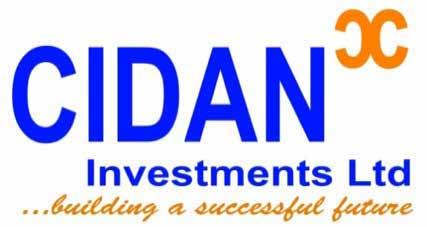













DECEMBER 9, 2022





DECEMBER 2 , 2022
DECEMBER 2, 2022
to national development and thanked the church for its support towards the construction of the National Cathedral.
He stated that, upon completion, the National Cathedral would serve not only as the country’s collective thanksgiving “to the Almighty for the blessings He has bestowed on our nation, sparing us the ravages of civil war that have bedevilled the histories of virtually all our neighbours, and the outbreak of deadly mass epidemics, but also as a rallying point for the entire Christian Community of Ghana, which represents 70 per cent of the population.”
ers, and transport operators, who at the height of the Cedi’s recent depreciation increased prices of goods and services to reduce their prices now that the Cedi is regaining much of its strength.

“I believe this is not only a fair request but also a just one… I urge all of you to join me in the clarion call so that at the very least, we can have a more pleasant Christmas,” he said.
The President made the call at a special service to climax activities to mark the Centenary Anniversary celebration of the Ga Presbytery of the Presbyterian Church of Ghana at the Independence Square in Accra.

The occasion was on the theme: “Grateful for our Heritage, Forging Ahead in Unity and Faith.”
The President told the gathering that the strengthening of the Cedi “has not happened by Chance,” but through the implementation of deliberate policies by the Government in collaboration with the Bank of Ghana.
Those interventions include Cedi liquidity tightening measures resulting in the o oading of forex as a store of value by speculators, the improvement of forex in ows from remittances and the mining sectors, and the reaching of the
gains made,” he said.
The Cedi appreciated 47 percent against the dollar and gained on all other currencies as of Friday’s close.
Noting that the country was not out of the woods, President Akufo-Addo said the government was determined to implement the appropriate policy measures to consolidate and sustain the gains made by the cedi in recent times.
“With appropriate policy, determination and hard work on our part, things are begging to turn around; what seemed impossible yesterday is now becoming possible.
“We are de nitely not yet out of the woods, however today, the Cedi is rapidly appreciating against the US dollar and all major currencies, making up for its losses and the price of petroleum products are reducing at the pump.” he said.
The President disclosed the Bank of Ghana, in the weeks ahead, would continue the purchases of forex from the mining and oil sectors to enhance liquidity supply to the market.
The Bank would also continue with the single, uni ed forex forward auction and some
“is determined to bring even further relieve to you” and return the economy to the high rate of growth that characterized the country’s development in the three years before the COVID-19 outbreak in 2020. He, however, insisted that “we can only do so if we forge ahead in unity and in faith, and have the believe that with the Almighty God, the fortunes of Ghana under the presidency of Akufo-Addo will be restored.”
“I will thus appeal to you to bear with Government in this di cult period as we work to chart a path out of the storm. I know times are hard and are a ecting all of us, but this government will not shirk its responsibility to the people of Ghana to make the hard decisions that hard times demand, which may be painful just like injections, but we must take them if we are to be well again and get our economy back.
“The policies we are implementing today are meant to address the challenges, and I am sure they will, but in the meantime, I need your active understanding and cooperation …we can make it if all of us work at it,” he emphasized.
The President lauded the contributions of the Presbyterian church
The President said although there were those who did not share his view in the building of the Cathedral, “I respect their right to di er, but I am con dent in my decision and by the vast numbers of enthusiastic supporters of these projects, whose spiritual dimension is limitless.
He thus asked the Ga Presbytery, and all Christians, to continue to pray for Ghana’s peace and unity, so the nation can move forward in unity.
“I ask all of you to continue to pray for God’s peace and unity for Ghana so we can continue to move forward as a united nation.
“I need the support of every Ghanaian together with the prayers of the Church, to help me and my government carry out our mandate successfully…Pray for me so that the Almighty God will continue to give me wisdom, strength, courage, and compassion to enable me to execute my duties as a good leader. With Him all things are possible for the battle is the Lord’s,” he said.
The Moderator of the Presbyterian Church, Rt Rev Professor Joseph Obiri Yeboah Mante, expressed the appreciation of the Church for government’s e ort at restoring economic stability
GNA